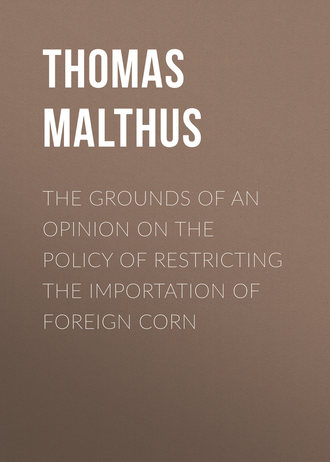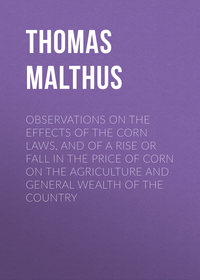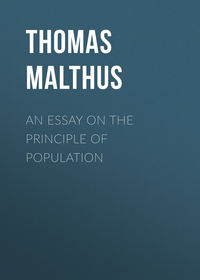 полная версия
полная версияThe Grounds of an Opinion on the Policy of Restricting the Importation of Foreign Corn
If, upon mature deliberation, we determine to open our ports to the free admission of foreign grain, we must not be disturbed at the depressed state, and diminished produce of our home cultivation; we must not be disturbed at our becoming more and more dependent upon other nations for the main support of our population; we must not be disturbed at the greatly increased pressure of the national debt upon the national industry; and we must not be disturbed at the fluctuations of price, occasioned by the very variable supplies, which we shall necessarily receive from France, in the actual state of her laws, or by the difficulty and expense of procuring large, and sudden imports from the Baltic, when our wants are pressing. These consequences may all be distinctly foreseen. Upon all general principles, they belong to the opening of our ports, in the actual state and relations of this country to the other countries of Europe; and though they may be counterbalanced or more than counterbalanced, by other advantages, they cannot, in the nature of things, be avoided.
On the other hand, if, on mature deliberation, we determine steadily to pursue a system of restrictions with regard to the trade in corn, we must not be disturbed at a progressive rise in the price of grain; we must not be disturbed at the necessity of altering, at certain intervals, our restrictive laws according to the state of the currency, and the value of the precious metals; we must not be disturbed at the progressive diminution of fixed incomes; and we must not be disturbed at the occasional loss or diminution of a continental market for some of our least peculiar manufactures, owing to the high price of our labour.17 All these disadvantages may be distinctly foreseen. According to all general principles they strictly belong to the system adopted; and, though they may be counterbalanced, and more than counterbalanced, by other greater advantages, they cannot, in the nature of things, be avoided, if we continue to increase in wealth and population.
Those who promise low prices upon the restrictive system, take an erroneous view of the causes which determine the prices of raw produce, and draw an incorrect inference from the experience of the first half of the last century. As I have stated in another place,18 a nation which very greatly gets the start of its neighbours in riches, without any peculiar natural facilities for growing corn, must necessarily submit to one of these alternatives—either a very high comparative price of grain, or a very great dependence upon other countries for it.
With regard to the specific mode of regulating the importation of corn, if the restrictive system be adopted, I am not sufficiently acquainted with the details of the subject to be able to speak with confidence. It seems to be generally agreed, that, in the actual state of things, a price of about eighty shillings a quarter19 would prevent our cultivation from falling back, and perhaps allow it to be progressive. But, in future, we should endeavour, if possible, to avoid all discussions about the necessity of protecting the British farmer, and securing to him a fair living profit. Such language may perhaps be allowable in a crisis like the present. But certainly the legislature has nothing to do with securing to any classes of its subjects a particular rate of profits in their different trades. This is not the province of a government; and it is unfortunate that any language should be used which may convey such an impression, and make people believe that their rulers ought to listen to the accounts of their gains and losses.
But a government may certainly see sufficient reasons for wishing to secure an independent supply of grain. This is a definite, and may be a desirable, object, of the same nature as the Navigation Act; and it is much to be wished, that this object, and not the interests of farmers and landlords, should be the ostensible, as well as the real, end which we have in view, in all our inquiries and proceedings relating to the trade in corn.
I firmly believe that, in the actual state of Europe, and under the actual circumstances of our present situation, it is our wisest policy to grow our own average supply of corn; and, in so doing, I feel persuaded that the country has ample resources for a great and continued increase of population, of power, of wealth, and of happiness.
1
Some of my friends were of different opinions as to the side, towards which my arguments most inclined. This I consider as a tolerably fair proof of impartiality.
2
Mercantile losses are always comparatively partial; but the present losses, occasioned by the unusual combination of low prices, and scanty produce, must inflict a severe blow upon the whole mass of cultivators. There never, perhaps, was known a year more injurious to the interests of agriculture.
3
At the same time, I certainly now very much wish that some regulation had been adopted last year. It would have saved the nation a great loss of agricultural capital, which it will take some time to recover. But it was impossible to foresee such a year as the present—such a combination, as a very bad harvest, and very low prices.
4
I have very little doubt that the value of paper in this country has already risen, norwithstanding the increased issues of the Bank. These increased issues I attribute chiefly to the great failures which have taken place among country banks, and the very great purchases which have been made for the continental markets, and, under these circumstances, increased issues might take place, accompanied even by a rise of value. But the currency has not yet recovered itself. The real exchange, during the last year, must have been greatly in our favour, although the nominal exchange is considerably against us. This shews, incontrovertibly, that our currency is still depreciated, in reference to the bullion currencies of the continent. A part, however, of this depreciation may still be owing to the value of bullion in Europe not having yet fallen to its former level.
5
Calculated at twenty-four livres the pound sterling.
6
It has been supposed by some, that this law cannot, and will not be executed: but I own I see no grounds for such an opinion. It is difficult to execute prohibitions against the exportation of corn, when it is in great plenty, but not when it is scarce. For ten years before 1757, we had in this country, regularly exported on an average, above 400,000 quarters of wheat, and in that year there was at once an excess of importation. With regard to the alleged impotence of governments in this respect, it appears to me that facts shew their power rather than their weakness. To be convinced of this, it is only necessary to look at the diminished importations from America during the war, and particularly from the Baltic after Bonaparte's decrees. The imports from France and the Baltic in 1810, were by special licences, granted for purposes of revenue. Such licences shewed strength rather than weakness; and might have been refused, if a greater object than revenue had at that time presented itself.
7
The average is 16 francs, 21 centimes, the Hectolitre. The Hectolitre is about 1-20th less than 3 Winchester bushels, which makes the English quarter come to about 38 shillings.
8
It appears from the evidence, that the corn from the Baltic is often very heavily taxed, and that this tax is generally raised in proportion to our necessities. In a scarce year in this country we could never get any considerable quantity of corn from the Baltic, without paying an enormous price for it.
9
By the real growing price of corn I mean the real quantity of labour and capital which has been employed to procure the last additions which have been made to the national produce. In every rich and improving country there is a natural and strong tendency to a constantly increasing price of raw produce, owing to the necessity of employing, progressively, land of an inferior quality. But this tendency may be partially counteracted by great improvements in cultivation, and economy of labour. See this subject treated in An inquiry into the nature and progress of rent, just published.
10
Sir John Sinclair's Account of the Husbandry of Scotland: and the General Report of Scotland.
11
"Inquiry into the Nature and Progress of Rent, and the Principles by which it is regulated."
12
I was not prepared to expect (as I intimated in the Observations) so sudden a fall in the price of labour as has already taken place. This fall has been occasioned, not so much by the low price of corn, as by the sudden stagnation of agricultural work, occasioned by a more sudden check to cultivation than I foresaw.
13
I am strongly disposed to believe, that it is owning to the unwillingness of governments to allow the free egress of their corn, when it is scarce, that nations are practically so little dependent upon each other for corn, as they are found to be. According to all general principles they ought to be more dependent. But the great fluctuations in the price of corn, occasioned by this unwillingness, tend to throw each country back again upon its internal resources. This was remarkably the case with us in 1800 and 1801, when the very high price, which we paid for foreign corn, gave a prodigious stimulus to our domestic agriculture. A large territorial country, that imports foreign corn, is exposed not infrequently to the fluctuations which belong to this kind of variable dependence, without obtaining the cheapness that ought to accompany a trade in corn really free.
14
See this subject treated in An Inquiry into the Nature and Progress of Rents.
15
Inquiry into the Nature and Progress of Rent.
16
It is to this class of persons that I consider myself as chiefly belonging. Much the greatest part of my income is derived from a fixed salary and the interest of money in the funds.
17
It often happens that the high prices of a particular country may diminish the quantity of its exports without diminishing the value of their amount abroad; in which case its foreign trade is peculiarly advantageous, as it purchases the same amount of foreign commodities at a much less expense of labour and capital.
18
Inquiry into the Nature and Progress of Rent.
19
This price seems to be pretty fairly consistent with the idea of getting rid of that part of our high prices which belongs to excessive issues of paper, and retaining only that part which belongs to great wealth, combined with a system of restrictions.





